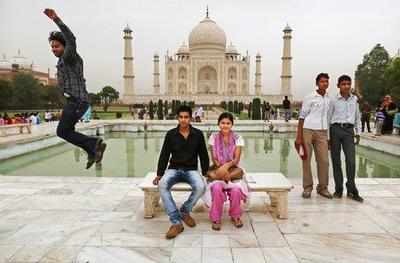- News
- India News
- To boost tourism, experts say better security needed at heritage sites, ministry says law and order a ‘state subject’
Trending
This story is from November 5, 2017
To boost tourism, experts say better security needed at heritage sites, ministry says law and order a ‘state subject’
The Union tourism ministry’s renewed efforts to improve security for foreign tourists in India has led to the revival of a long-pending proposal to depute the Central Industrial Security Force at key heritage monuments in the country.

The Union tourism ministry’s renewed efforts to improve security for foreign tourists in India has led to the revival of a long-pending proposal to depute the Central Industrial Security Force at key heritage monuments in the country.
NEW DELHI: The Union tourism ministry’s renewed efforts to improve security for foreign tourists in India, in the aftermath of the attack on the Swiss couple in Fatehpur Sikri last month, has led to the revival of a long-pending proposal to depute the Central Industrial Security Force at key heritage monuments in the country.
At present, CISF personnel guard important heritage monuments like the Taj Mahal in Agra, the Salar Jung museum in Hyderabad, and the Red Fort in New Delhi.In 2016, the Chennai circle of the Archaeological Survey of India (ASI) had also decided to rope in the services of the CISF, after an idol smuggling racket was unearthed. Red Fort was given CISF cover in 2000, while the Taj Mahal got it after a Supreme Court order in 2002.
Sources in the ministry said that even though 14 states in India, including Uttar Pradesh, where the Swiss couple and the German tourist was attacked, have tourism police, their effectiveness remains suspect. Government sources, however, added that though the ministry is concerned about the security of tourists, since law and order is a state subject, it finds it difficult to impose its will on state governments.
Former director general, CISF, Arvind Ranjan, however, said any effort to enhance the tourist experience and to improve security around tourist destinations must begin with the tourism ministry taking ownership of the initiative, and with coming up with a definitive policy that can cover security aspects, among other things. “Originally, in India, industrial security and the security of Indian borders were also subjects looked after by the state police. However, the CISF and BSF were raised because state police could not, dedicatedly, address the many concerns there were. Similarly, security for tourists and sites is a specialised need and should be catered to by a force, specially built, or existing,” Ranjan said.
Even though proposals to extend CISF cover to more heritage sites has been under consideration since as far back as 2009, monetary constraints are also believed to have come in the way of implementation. Deployment of CISF must be paid for by the department or agency that avails of the security agency’s services. Though this may only mean book adjustments at the government levels, the ministries of culture, tourism and home have so far not been able to agree on who should bear the necessary expenses for such deployment.
At present, CISF personnel guard important heritage monuments like the Taj Mahal in Agra, the Salar Jung museum in Hyderabad, and the Red Fort in New Delhi.In 2016, the Chennai circle of the Archaeological Survey of India (ASI) had also decided to rope in the services of the CISF, after an idol smuggling racket was unearthed. Red Fort was given CISF cover in 2000, while the Taj Mahal got it after a Supreme Court order in 2002.
Sources in the ministry said that even though 14 states in India, including Uttar Pradesh, where the Swiss couple and the German tourist was attacked, have tourism police, their effectiveness remains suspect. Government sources, however, added that though the ministry is concerned about the security of tourists, since law and order is a state subject, it finds it difficult to impose its will on state governments.
Former director general, CISF, Arvind Ranjan, however, said any effort to enhance the tourist experience and to improve security around tourist destinations must begin with the tourism ministry taking ownership of the initiative, and with coming up with a definitive policy that can cover security aspects, among other things. “Originally, in India, industrial security and the security of Indian borders were also subjects looked after by the state police. However, the CISF and BSF were raised because state police could not, dedicatedly, address the many concerns there were. Similarly, security for tourists and sites is a specialised need and should be catered to by a force, specially built, or existing,” Ranjan said.
Advocating a shift from publicity to building tourist infrastructure — including measures to improve security — the former top cop also said there should be a closer coordination between the ministry and industry stakeholders who can advice government on what tourists need. “Once the ministry lays down broad guidelines, systems can be structured around that to train personnel, and to get them to work as tourist facilitators who are also equipped to prevent crimes against tourists,” Ranjan said.
Even though proposals to extend CISF cover to more heritage sites has been under consideration since as far back as 2009, monetary constraints are also believed to have come in the way of implementation. Deployment of CISF must be paid for by the department or agency that avails of the security agency’s services. Though this may only mean book adjustments at the government levels, the ministries of culture, tourism and home have so far not been able to agree on who should bear the necessary expenses for such deployment.
End of Article
FOLLOW US ON SOCIAL MEDIA










